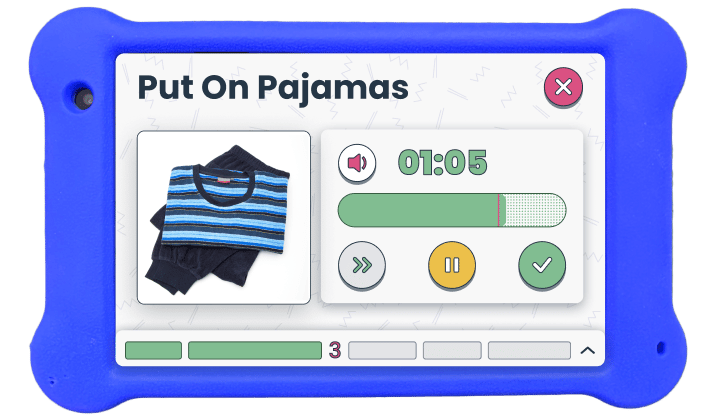Do you dread bedtime because you know that your child is prone to tantrums? ADHD meltdowns at bedtime are stressful for both you and your child… and no one sleeps well when stressed. And… no one has a good day when they are sleep deprived. This cycle downright sucks.
Table of Contents
While occasional tantrums are normal, you can do your part to prevent them. We’re here to talk about it.
Read on to learn all about bedtime meltdowns and how to stop them from happening.
Read more: How to Prevent an Autism Meltdown
Why Do ADHD Meltdowns Happen Near Bedtime?
It’s not uncommon for all children, neurodivergent or neurotypical, to experience the occasional meltdown. Neurodivergent children, however, are more prone to meltdowns and tantrums as a whole.
Children with ADHD are more likely to have emotional outbursts as a result of their ADHD symptoms. They often struggle with emotional management, even with help, and those emotions have to go somewhere.
Children with ADHD also struggle with impulse control and they’re likely to experience fatigue (as ADHD can cause sleep troubles). All of these things combined can turn into an emotional volcano that’s just waiting to burst at night before bed.
It’s possible that your child’s medication may make them feel more irritable or anxious late at night, especially if you haven’t developed a good nighttime routine. Make sure to check with your doctor if your kiddo is really struggling!
In other words, bedtime isn’t a trigger in and of itself, but it could be the final stressor that causes a child to meltdown.
Read more: ADHD Sleep Issues: What to Know and How to Help
What Does an ADHD Bedtime Meltdown Look Like?
So how do you know when your child is going through ADHD tantrums?
These tantrums can happen at any age. Even older children and teenagers might have emotional outbursts around bedtime when they have unmanaged ADHD.
The child may become combative or start to cry when it’s time for them to go to bed. They may lash out at other family members or refuse to go into their room altogether
The child may get into bed and try to sleep, but they may wake up crying or start crying before they even fall asleep. This may not look like a traditional meltdown.
It’s common for signs of a meltdown to start appearing before the meltdown actually happens. You may notice irritability, hyperactivity, or extreme drowsiness as signs that there may be a meltdown in your child’s future. Pay attention to your child’s behavior and you’ll learn how to spot the signals so you can work on meltdown prevention.
Read more: Pathological Demand Avoidance Test for Kids
Is ADHD Hereditary?
If a parent has ADHD, their child has a 50% chance of also having ADHD. Are you asking yourself, do I have ADHD? Take our brief adult ADHD test below to see if you experience common symptoms associated with ADHD.
3 Ways You Can Help Prevent ADHD Meltdowns at Bedtime

Dealing with ADHD meltdowns can be really challenging. It is always a good idea to plan ahead and aim to prevent these meltdowns from happening in the first place. Of course, some tantrums may still break through, but with proper planning, your child should experience them less frequently.
Here are a few things that you should start helping your child with if you want to prepare your child for bedtime without a meltdown.
Read more: Free Printable ADHD Behavior Charts
1. Structure and Consistency: A Good Bedtime Routine
All children thrive with structure. Children with ADHD need it even more. Having a set routine that’s broken down into digestible parts will allow your child to stay calm and focused before bed.
Work together with your child to create the routine and have them help you create a bedtime routine chart. This gives your child autonomy over their routine and may make them more willing to follow it.
Keep routines light and fun. This might mean that you always do a specific fun activity with your child before bed (like reading a book) or that they have a special bedtime ritual that makes them happy.
You need to stay consistent to the best of your ability. At first, make sure that your child is sticking with their routine even on weekends when they have no need to be up early.
Consistency will help solidify the routine in your child’s mind and help them stay calmer when it’s time to go to bed.
A bonus tip: try to start limiting screentime at least an hour before bed. This should make it easier to calm your child down and help them get to sleep.

2. Positive Association: Independence and Rewards
Reward systems are helpful for neurodivergent children. Encourage good behavior by introducing rewards around bedtime.
Rewards don’t have to be extravagant. You can give your child stickers, reward them with a favorite snack the next morning, or have them collect points over time to earn larger rewards.
To earn a reward, your child should be able to work their way through their own bedtime routine (after you establish it). To help with that, apps like Goally will guide your child every step of the way.
It can also be helpful to reward your child for recognizing their own pre-tantrum feelings and calming themselves down. This is a great life skill and it takes a lot of emotional control.
3. Health: Exercise and Food
We know you hear this all the time, but, truly, making sure that your child is living a healthy lifestyle is a great way to help prevent meltdowns at bedtime (and at any other time).
While healthy foods won’t cure your child’s ADHD, there’s some evidence to suggest that, when in combination with treatment, proper nutrition can help alleviate some ADHD symptoms.
Make sure that your child is avoiding sugar and caffeine before bedtime. Even small amounts may make it hard for them to sleep. They’ll then get overtired and a meltdown will be on the horizon.
Exercising every day, even if it’s just playing at recess, will make it easier for your child to rest at night. They’ll be able to get out all of that excess energy while they have fun.
What To Do if Your Child Keeps Having Meltdowns
It can be tough to deal with your child’s meltdowns, but have you considered seeking help from a doctor or therapist? If your child is already seeing a therapist or psychiatrist on a regular basis, it might be a good idea to bring up your concerns with them and see if there are any adjustments that can be made to their treatment plan.
Don’t allow the tantrums to disrupt your child’s sleep schedule. There’s nothing wrong with asking for help!
ADHD Meltdowns at Bedtime Are Manageable
ADHD meltdowns at bedtime are stressful for parents and children alike! By taking the right steps, however, you can help your child avoid those pre-bedtime meltdowns. Bedtime doesn’t have to be a catastrophe.
Are you looking for ways to help your child manage their ADHD? Goally is here to save the day. It makes creating and maintaining routines fun and rewarding. Check out our pricing plan or try a free demo today.
FAQs About ADHD Meltdowns at Bedtime
ADHD meltdowns at bedtime can occur when children with ADHD become overstimulated or overwhelmed, leading to emotional outbursts, difficulty falling asleep, or trouble staying asleep.
ADHD meltdowns at bedtime can be caused by a variety of factors, including changes in routine, anxiety or stress, medication wear-off, or overstimulation from screens or other sensory inputs.
To help prevent ADHD meltdowns at bedtime, you can establish a consistent bedtime routine, limit screen time before bed, provide calming sensory input like weighted blankets or white noise machines, and talk to your child’s doctor about medication adjustments.
To help calm your child during an ADHD meltdown at bedtime, you can provide a quiet and safe space, use calming techniques like deep breathing or visualization, offer a comforting object like a stuffed animal or blanket, and avoid engaging in arguments or power struggles.
If your child’s ADHD meltdowns at bedtime are impacting their overall quality of life or causing significant distress for you or your family, it may be time to seek professional help from a doctor or therapist who specializes in ADHD.
This post was originally published on 02/08/2022. It was updated on 03/29/2023.

Goally
We help parents teach their kids life skills, like doing bedtime and morning independently. Backed by science, we incorporate evidence-based practices and expert-informed designs in all of our apps and content.






